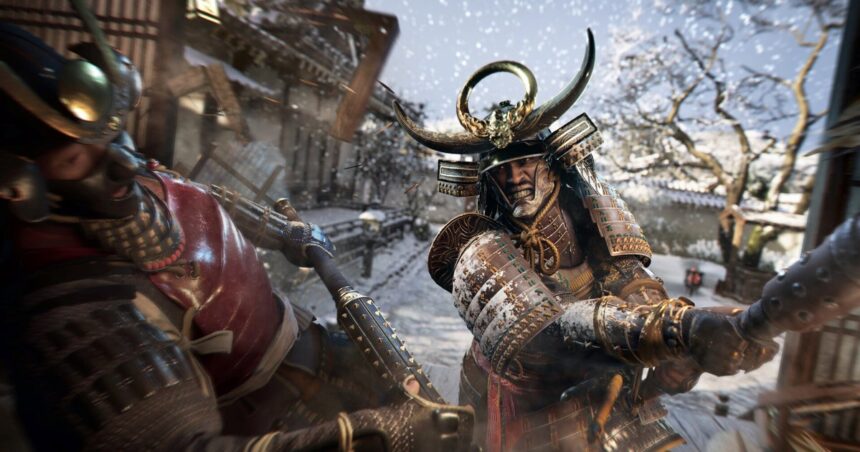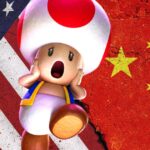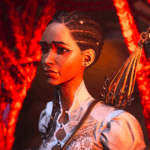It’s been a fairly grim few years for Ubisoft – buffeted by allegations of an abusive culture, plagued by dismal stock market performance, and seemingly unable to turn out the kind of hit titles that would silence its detractors, the company has seen its strategy and its future openly called into question.
Late 2024 was a low point. Star Wars Outlaws underperformed commercially and the company’s other great hope for that period, Assassin’s Creed Shadows, was pushed back into 2025 after becoming the target of an online outrage campaign over its choice of protagonist characters. Consequently, there have probably been some heartfelt sighs of relief at the company as the sales figures for Shadows finally started to roll in over the past few weeks.
We don’t have precise numbers yet, but while Shadows doesn’t seem set to break any records, nor is it doing badly by any reasonable measure, and in the US at least, it’s reportedly running in second place in the annual sales charts thus far. It’s trailing only Capcom’s immensely successful Monster Hunter Wilds.
It’s hard to overstate how important this is for Ubisoft. The Assassin’s Creed franchise sometimes flies under the radar a little compared to other powerhouse franchises, because it isn’t a bankable annual event like Call of Duty or a complete sales juggernaut like Grand Theft Auto.
Nonetheless, it’s a franchise whose mainline entries have the kind of broad consumer appeal many other IP holders would sell their grandmothers to attain. The last major entry in the series, 2020’s Assassin’s Creed Valhalla, comfortably clocked up over a billion dollars in revenue, and the franchise overall has sold over 200 million games, putting it in roughly the same bracket as Final Fantasy or Resident Evil for lifetime franchise sales. It’s not quite big enough to be the single tentpole IP that holds up all of Ubisoft, but it’s the closest thing the company has to that. If the Assassin’s Creed franchise was actually to lose its mojo, it’s honestly hard to imagine what Ubisoft’s commercial path forwards would look like.
One of the biggest problems is that such manufactured controversy is incredibly random in nature
Assassin’s Creed Shadows was therefore a make-or-break title – and before the delay and the manufactured controversy, it looked like a shoo-in. Fans had been clamouring for the heavily ninja-inspired series to do an instalment set in Japan for years; Assassin’s Creed Shadows is, on paper at least, a perfect example of giving your fanbase precisely what they want most. We don’t yet know how Shadows has stacked up to Ubisoft’s internal sales expectations, but the positive buzz around the sales data and the generally positive responses to the game from consumers suggest that it’s done what it was supposed to do – namely, proved that the AC franchise still has gas in the tank at a crucial juncture for the company.
The fact that we even need to have this conversation (“they set an Assassin’s Creed game in Japan and it sold well” would have felt like the most staggeringly obvious thing only a few years ago) is largely down to the aforementioned controversy – a very intense “anti-woke” campaign against the game, which was sparked off when it was revealed that the playable protagonists would be a Black man and a woman. As is generally the case with these things, the initial racist and misogynistic backlash was quickly veiled in more broad-based concern trolling, alleging that Shadows was disrespectful or derogatory towards Japanese culture and religion in general.
Things got very silly, very quickly. A historian who consulted on the game’s depiction of its Black protagonist, Yasuke – a historically attested figure who has been featured uncontroversially in plenty of media over the years – was targeted by online harassment and it was falsely reported that he had been dismissed by his university.
Twitter found itself home to a steady influx of accounts claiming to be outraged Japanese gamers who happened to post in fluent English and very obviously Google Translated Japanese. A few enterprising Japanese right-wing influencers did try to make hay from the controversy, albeit with limited success; one widely shared video in which a creator raged about the game allowing him to smash up a Shinto shrine was widely ridiculed by commenters, who pointed out rather reasonably that the creator himself was the one smashing the virtual shrine and getting mad about his own actions.
The campaign’s high water mark came when a lawmaker in Japan’s Diet asked the Prime Minister about defacing shrines in the game during an open question session. The questioner, Kada Hiroyuki, is a relatively unknown one-term Councillor whose marginal seat is at severe risk in the upcoming July election, so it was a fairly transparent grab for attention. PM Ishiba’s answer entirely sidestepped any mention of the game to focus instead on some recent cases where real-life shrines were vandalised. Still, it was translated (or in some cases, wilfully mistranslated) as a triumph: get woke, go so broke that they’ll ask time-wasting questions about you in the Japanese Diet, I guess.
Storied game director and exceptional Twitter poster Kamiya Hideki, perhaps unsurprisingly, had the most level-headed take on the whole affair, pointing out in essence that when a fuss like this is being made by a relatively small group of extremely vocal people, it means little to a large majority of ordinary folk who will simply shrug their shoulders and quietly enjoy the game. The sales figures now trickling in suggest that he was essentially right.
Incidentally, in the supposedly incensed and insulted Japanese market, physical sales of the game are sitting at around 25,000 – far from a smash hit, but reasonably solid for a PS5 launch in that territory. Back of the envelope calculations suggest that total sales in Japan are probably broadly in line with 2020’s Valhalla, taking into account the massive switchover from physical to digital sales that’s happened in that timeframe. For comparison, Monster Hunter Wilds sold less than half as many physical copies as 2018’s MH World in its first week, but still sold significantly more copies overall once digital is factored in.
These kinds of controversies around games and other kinds of media have become commonplace in recent years, and many companies struggle to figure out how much attention to pay to them, or how best to respond. One of the biggest problems is that such manufactured controversy is incredibly random in nature; companies trying to figure out how to avoid being the target of this kind of hate campaign are essentially setting out on an entirely fruitless quest, because there’s little rhyme or reason to the special alignment of planets that turn a specific game or company into the right-wing punching bag of the week.
Completely excluding whole swathes of ethnicities and identities from your game entirely is potentially far more commercially damaging than any online hate campaign might be – and even then, the stochastic finger of internet outrage may still end up pointing at some member of your team, some seemingly innocuous public statement, or even something entirely made up from whole cloth.
Stick to your guns and release the best game you can – it’s not just AC Shadows that shows this to be an effective approach
The triggers for these outbursts only seem obvious in hindsight. I’ve seen people argue that Ubisoft was deliberately provoking a response by choosing Black and female protagonists, but when the company chose to use Yasuke as a protagonist, it was doing so off the back of well-received depictions of him in games like Nioh and Samurai Warriors, a highly rated Netflix anime series based on his life, and his role as inspiration for the hugely popular Afro Samurai anime series.
None of those had caused so much as the barest whisper of controversy. Yasuke seemed like a safe bet, not to mention a perfect figure for the narrative, being that he was a total outsider who moved through some of the most interesting events of Japanese history. (As for the long history of popular, uncontroversial depictions of female ninjas, where to even start?)
Wrong place, wrong time, wrong side of bed to get out of; these reactions are impossible to predict, and trying to design games “defensively” to avoid people on the Internet getting mad at you is likely to cause far more harm in the long run than the ravings of any number of sock puppet accounts could.
Moreover, Ubisoft seems to have set out a reasonably decent playbook for how to deal with this sort of campaign when it does happen. The situation around Shadows was exacerbated by the delay to the game, which was interpreted as panic on Ubisoft’s side and a sniff of blood in the water for its detractors. In reality, any panic was entirely down to Star Wars Outlaws’ underperformance, not anything happening online. Shadows was delayed not to remove or change content that its detractors deemed objectionable, but rather to ensure the game was polished and high quality at launch, which is pretty much the best response there is to such bad-faith criticisms.
Stick to your guns and release the best game you can – it’s not just Assassin’s Creed Shadows that shows this to be an effective approach. Aggressively anti-woke campaigns against games like Baldur’s Gate 3 have even tried to turn on a dime and claim that the game is actually on their side of the argument when it became clear that it was immensely successful and popular.
That may not fully happen to AC Shadows, which is unlikely to be quite the commercial juggernaut or the critical darling that BG3 was, but the lesson is clear – just as Kamiya suggested, a critical mass of ordinary people playing and enjoying a game will easily overpower the reach and volume of a small bad-faith negative campaign.





